 Nokia has launched three new Nseries mobile multimedia handsets, capable of taking print-quality pictures, playing MP3s, reading e-mail, browsing the Web sites and viewing mobile TV.
Nokia has launched three new Nseries mobile multimedia handsets, capable of taking print-quality pictures, playing MP3s, reading e-mail, browsing the Web sites and viewing mobile TV.
They might sound like a collection of night buses, but Nokia’s N90, N91 and N70 phones could represent a major step forward in multimedia mobile convergence.
“This next step in digital convergence brings together mobile devices, Internet content, still and video cameras, music, email and much more. Nokia Nseries devices share similar design traits as mobile phones, but they are actually powerful pocketable computers with a comprehensive set of multimedia features,” said Anssi Vanjoki, Executive Vice President, Multimedia, Nokia.
Nokia N91
The Nokia N91 multimedia handset looks to be facing up to Apple’s iPod, offering a two megapixel camera, Bluetooth and a 4-gigabyte hard disk, (capable of storing up to 3,000 CD-quality songs) inside its natty stainless steel case.
Serving up to 12.5 hours of sound via the included remote-control headset, the Nokia N91 supports a wide range of digital music formats including MP3, M4A, AAC and WMA.
Playback is made easy with dedicated music keys on the phone’s face, which slides down to reveal the phone keypad.
“The Nokia N91 delivers both a fantastic music experience and cutting-edge phone features,” purred Jonas Geust, Vice President, Music at Nokia. “What sets the Nokia N91 apart is the fact that it is always connected – you can download new music while on the move, add it to your favourite playlist and then share your playlist with friends. It’s truly the world’s best mobile connected jukebox.”
 Nokia N90
Nokia N90
The N90 features a twister-tastic, rotating camera barrel which fires up the phone’s 2 megapixel camera (with Carl Zeiss lens), offering autofocus, an integrated flash and 20x digital zoom.
The tri-band phone’s main display has a 352 x 416 pixel screen (262,144 colours), with a secondary 128 x 128 pixels display on the front.
With its pioneering multi-hinge twist-and-shoot design, we have brought ease-of-use and high quality photography into mobile telephony,” enthused Juha Putkiranta, senior vice president of multimedia imaging at Nokia.
Using the main screen as a viewfinder, the N90 can capture high quality video in MP4 format, with a 8x digital zoom.
 Images, videos and sound can be stored on the phone’s internal 31 MB memory or on the supplied 64 MB RS-MMC
Images, videos and sound can be stored on the phone’s internal 31 MB memory or on the supplied 64 MB RS-MMC
The 3G-enabled N90 is expected to be the first to hit the market this summer, with a suggested retail price for the N90 is €700 (~US$909 ~£474),
Nokia N70
Finally, the 3G-enabled Nokia N70 once again features a 2 megapixel camera, flash and front camera for video calling, with a FM radio, a digital music player and new 3D games.
The camera is activated by a rear sliding cover, with a range of capture scene settings available, including Scenery, Portrait, Night, and Sports.
 Joe Coles, Director of imaging product marketing at Nokia, stressed the consumer demand for camera-enabled mobiles: “The number one reason why people today purchase new handsets is the camera. Indeed, we foresee that by the end of 2005, over half a billion people worldwide will own a camera phone.”
Joe Coles, Director of imaging product marketing at Nokia, stressed the consumer demand for camera-enabled mobiles: “The number one reason why people today purchase new handsets is the camera. Indeed, we foresee that by the end of 2005, over half a billion people worldwide will own a camera phone.”
Measuring a diminutive 108.8 x 53 x 17.5 mm, the Nokia N70 is the smallest ever 2 megapixel 3G smartphone based on the Series 60 Platform and is expected to be available in the third quarter of 2005.
This new range of innovative phones represent further evidence of the convergence of consumer devices, with mobile phone makers keen to get a lion size bite of the action.
Nokia already claims to the biggest camera vendor in the world, and anticipates that these new phones will help secure its position as the largest seller of portable MP3 players later this year.
Nokia
Samsung’s Hard Drive Phone
 Purring like a cat recumbing in cream, Apple CFO Peter Oppenheimer revealed that Apple’s iPod shuffle has snaffled a 58 per cent share of the flash-based digital media market in the US.
Purring like a cat recumbing in cream, Apple CFO Peter Oppenheimer revealed that Apple’s iPod shuffle has snaffled a 58 per cent share of the flash-based digital media market in the US.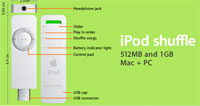 Positively glowing with confidence, Oppenheimer claimed that MP3 capability in handsets will be more complementary than a replacement, with handsets suffering from “a worse user interface and limited battery life,”
Positively glowing with confidence, Oppenheimer claimed that MP3 capability in handsets will be more complementary than a replacement, with handsets suffering from “a worse user interface and limited battery life,”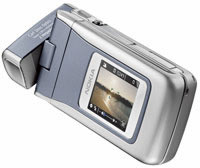 Nokia continues to be the Big Cheese of the worldwide mobile handset market, shipping nearly twice as many phones as its nearest competitor, Motorola.
Nokia continues to be the Big Cheese of the worldwide mobile handset market, shipping nearly twice as many phones as its nearest competitor, Motorola.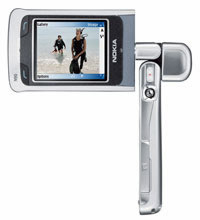
 The clever-clogs at Toshiba Research Europe have announced that they have been successful in applying quantum cryptography to the transmission of video and voice over IP.
The clever-clogs at Toshiba Research Europe have announced that they have been successful in applying quantum cryptography to the transmission of video and voice over IP. Toshiba’s quantum video link increases the security of communication systems by encrypting every single video frame with a unique digital key – so cracking one frame of a video would be useless unless all the other frames were cracked too.
Toshiba’s quantum video link increases the security of communication systems by encrypting every single video frame with a unique digital key – so cracking one frame of a video would be useless unless all the other frames were cracked too. “Imagine if you received a letter, you opened that letter and read it, there is no way of telling if someone has read that letter en route. When you encode the information on single particles, the letter self destructs whenever someone else reads it.”
“Imagine if you received a letter, you opened that letter and read it, there is no way of telling if someone has read that letter en route. When you encode the information on single particles, the letter self destructs whenever someone else reads it.”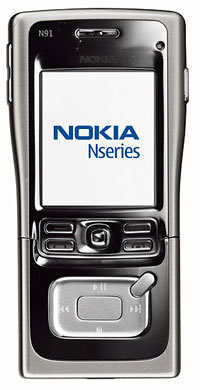 Nokia has launched three new Nseries mobile multimedia handsets, capable of taking print-quality pictures, playing MP3s, reading e-mail, browsing the Web sites and viewing mobile TV.
Nokia has launched three new Nseries mobile multimedia handsets, capable of taking print-quality pictures, playing MP3s, reading e-mail, browsing the Web sites and viewing mobile TV.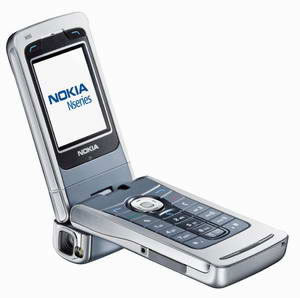 Nokia N90
Nokia N90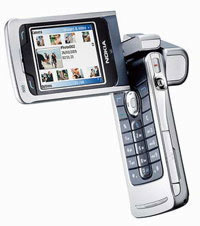 Images, videos and sound can be stored on the phone’s internal 31 MB memory or on the supplied 64 MB RS-MMC
Images, videos and sound can be stored on the phone’s internal 31 MB memory or on the supplied 64 MB RS-MMC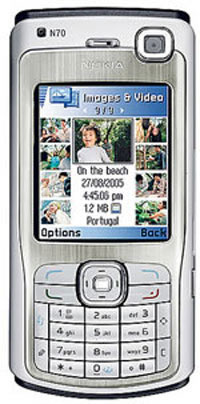 Joe Coles, Director of imaging product marketing at Nokia, stressed the consumer demand for camera-enabled mobiles: “The number one reason why people today purchase new handsets is the camera. Indeed, we foresee that by the end of 2005, over half a billion people worldwide will own a camera phone.”
Joe Coles, Director of imaging product marketing at Nokia, stressed the consumer demand for camera-enabled mobiles: “The number one reason why people today purchase new handsets is the camera. Indeed, we foresee that by the end of 2005, over half a billion people worldwide will own a camera phone.”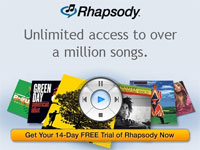 Real Networks is looking to up-end Apple’s iTunes store and nobble Napster To Go by launching a new music subscription services for portables music players.
Real Networks is looking to up-end Apple’s iTunes store and nobble Napster To Go by launching a new music subscription services for portables music players. Rhapsody 25 is the entry-level standard service which is completely free to use. It’s being supported by advertising, initially Chrysler and is designed to tempt people to subscribe. It allows anyone who downloads Rhapsody’s Windows-based jukebox software to listen to 25 songs for free each month from Rhapsody’s library, with the option to purchase and download songs a la carte. There will also be 25 ad-free radio stations available.
Rhapsody 25 is the entry-level standard service which is completely free to use. It’s being supported by advertising, initially Chrysler and is designed to tempt people to subscribe. It allows anyone who downloads Rhapsody’s Windows-based jukebox software to listen to 25 songs for free each month from Rhapsody’s library, with the option to purchase and download songs a la carte. There will also be 25 ad-free radio stations available. It’s been likened to having your CD collection on permanent hire purchase – once you lapse on your payments, you can kiss goodbye to your tunes. To old-school music fans, not owning your precious sounds is a bonkers proposition, but both Real and Napster believe there’s a market for subscription-based music downloads, with punters excited by the promise of filling an entire iPod for less than the price of two CDs.
It’s been likened to having your CD collection on permanent hire purchase – once you lapse on your payments, you can kiss goodbye to your tunes. To old-school music fans, not owning your precious sounds is a bonkers proposition, but both Real and Napster believe there’s a market for subscription-based music downloads, with punters excited by the promise of filling an entire iPod for less than the price of two CDs.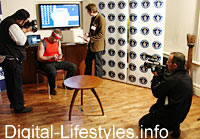 Digital-Lifestyles were on hand to witness a new world record being created, as former World Text Champion Arttu Harkki used a Treo 650 smartphone to type the fastest-ever email on the move using a QWERTY keyboard – using a single thumb.
Digital-Lifestyles were on hand to witness a new world record being created, as former World Text Champion Arttu Harkki used a Treo 650 smartphone to type the fastest-ever email on the move using a QWERTY keyboard – using a single thumb.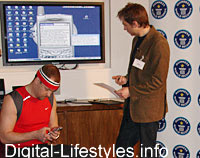 Before the record attempt could start, Hein Le Roux, official adjudicator from Guinness World Records explained the rules, “There are a lot of phones that incorporate QWERTY keyboards, and we need to make sure that the record is standard across all models. For this reason, we asked Arttu Harkki to type using just the thumb of one hand.”
Before the record attempt could start, Hein Le Roux, official adjudicator from Guinness World Records explained the rules, “There are a lot of phones that incorporate QWERTY keyboards, and we need to make sure that the record is standard across all models. For this reason, we asked Arttu Harkki to type using just the thumb of one hand.”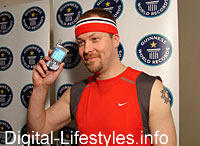 As the stopwatch-toting Le Roux looked keenly on, Harkki’s mighty uni-thumb went supernova as he bashed out the following message:
As the stopwatch-toting Le Roux looked keenly on, Harkki’s mighty uni-thumb went supernova as he bashed out the following message: Once I’d recovered from the high octane excitement of watching someone write a text message repeatedly, I asked Le Roux what the previous record had been, and was surprised to find that there hadn’t been one, because this was a new category.
Once I’d recovered from the high octane excitement of watching someone write a text message repeatedly, I asked Le Roux what the previous record had been, and was surprised to find that there hadn’t been one, because this was a new category.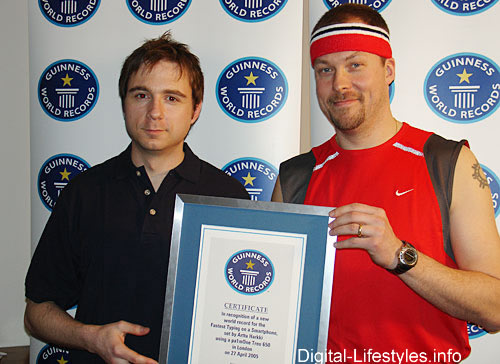
 AbbiTalk, a West Sussex-based provider of Voice Over IP (VoIP) telephony services, is talking tough about its cut-rate broadband call packages, that offer customers extra telephone lines with discount local and UK call charges and no line rental.
AbbiTalk, a West Sussex-based provider of Voice Over IP (VoIP) telephony services, is talking tough about its cut-rate broadband call packages, that offer customers extra telephone lines with discount local and UK call charges and no line rental.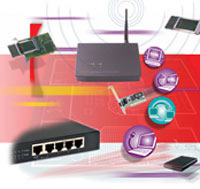 Prices start at £149 for “AbbiTalkBasicOne”, which provides one extra phone line, a unique number with Pre Pay phone account, an adaptor and a DECT digital cordless phone with digital answering machine.
Prices start at £149 for “AbbiTalkBasicOne”, which provides one extra phone line, a unique number with Pre Pay phone account, an adaptor and a DECT digital cordless phone with digital answering machine.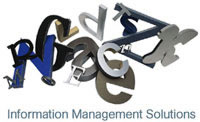 No line rental is charged and there’s no need to use a computer to make the calls as these are accomplished through the standard cordless handsets.
No line rental is charged and there’s no need to use a computer to make the calls as these are accomplished through the standard cordless handsets. BBCi has launched a programming service for digital satellite viewers showcasing short films made by ordinary folk across the UK.
BBCi has launched a programming service for digital satellite viewers showcasing short films made by ordinary folk across the UK.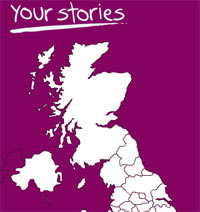 Video Nation broke new ground when it first hit UK TV screens – running in short slots dropped in to the programming schedule.
Video Nation broke new ground when it first hit UK TV screens – running in short slots dropped in to the programming schedule. Content on the ‘Your Stories’ service is divided into daily themes, each with its own title. “My Music”, for example, featured an eight-year-old trumpet player and a blind pianist.
Content on the ‘Your Stories’ service is divided into daily themes, each with its own title. “My Music”, for example, featured an eight-year-old trumpet player and a blind pianist.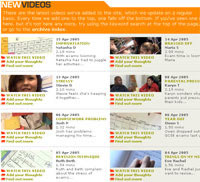 BBCi controller, Rahul Chakkara, explained the reasoning behind Your Stories service: “The BBCi audience is maturing, and is looking for content that is social and highly involving, available to them whenever they want.”
BBCi controller, Rahul Chakkara, explained the reasoning behind Your Stories service: “The BBCi audience is maturing, and is looking for content that is social and highly involving, available to them whenever they want.” Unlike several telecoms companies in the US who are hell bent on blocking free Wi-Fi hotspots, BT has stated that it has “no problems” with the concept.
Unlike several telecoms companies in the US who are hell bent on blocking free Wi-Fi hotspots, BT has stated that it has “no problems” with the concept.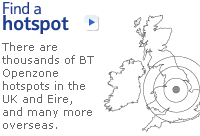 The network covers the length of Upper Street – one of the busiest streets in Islington – with the Council donating PCs to some local businesses as part of its push to boost economic activity in the area and to encourage local residents onto the Internet.
The network covers the length of Upper Street – one of the busiest streets in Islington – with the Council donating PCs to some local businesses as part of its push to boost economic activity in the area and to encourage local residents onto the Internet. Clark does not envisage US-style legal wrangling in the future for the UK and expressed confidence that if more people use Wi-Fi it will drive demand for BT’s services.
Clark does not envisage US-style legal wrangling in the future for the UK and expressed confidence that if more people use Wi-Fi it will drive demand for BT’s services.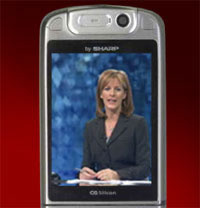 ITN is set to steal a march on its rivals by delivering up-to-the minute election analysis and comment through a partnership with Vodafone Live!
ITN is set to steal a march on its rivals by delivering up-to-the minute election analysis and comment through a partnership with Vodafone Live!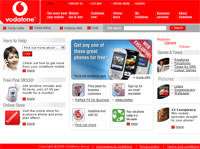 Nicholas Wheeler, managing director of multimedia content at ITN, commented: “This is a new facility using mobile technology that was not available at the time of the last election.”
Nicholas Wheeler, managing director of multimedia content at ITN, commented: “This is a new facility using mobile technology that was not available at the time of the last election.”